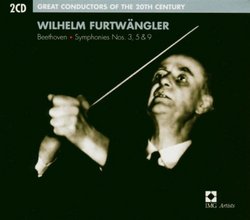| All Artists: Vienna Philharmonic Orchestra, Berlin Philharmonic Orchestra Title: Great Conductors of the 20th Century: Wilhelm Furtwangler Members Wishing: 0 Total Copies: 0 Label: EMI Classics Release Date: 7/13/2004 Genre: Classical Styles: Historical Periods, Classical (c.1770-1830), Modern, 20th, & 21st Century, Symphonies Number of Discs: 2 SwapaCD Credits: 2 UPC: 724356287525 |
Search - Vienna Philharmonic Orchestra, Berlin Philharmonic Orchestra :: Great Conductors of the 20th Century: Wilhelm Furtwangler
 | Vienna Philharmonic Orchestra, Berlin Philharmonic Orchestra Great Conductors of the 20th Century: Wilhelm Furtwangler Genre: Classical
|
Larger Image |
CD Details |
CD ReviewsCan we have a better transfer of perhaps the Ultimate Ninth? Ralph J. Steinberg | New York, NY United States | 08/17/2004 (5 out of 5 stars) "This 1937 Ninth from London was called Furtwangler's single greatest achievement by his former secretary, Bertha Geissmar. Prior to this issue, I have owned the Japanese EMI LP issue; while it could certainly be identified as potentially the greatest Ninth on disc, the dim, cramped sound prevented that potential from becoming reality. Sadly, the same is true of this reissue, although there is somewhat improved sound in the Adagio and the Finale. Im addition, EMI has cut the Scherzo and Trio of one repeat each, which robs the listener the sense of ever-evolving tempi that are so much a part of Furtwanglerian symphonic growth. I would have preferred to forego one of the other symphonies listed in this set (I have not listened to them as yet). Nevertheless, this in my opinion just might be Furtwangler's - and anyone's - finest statement of this score, and that is a mouthful, considering the wonders of the 1942 Berlin, 1951 Bayreuth, and 1954 Philharmonia performances. This performance is in a class with his 1937 EMI Fifth Symphony, a perfect balance between impulse and structure. The soloists are the best of any Furtwangler Ninth, and do not suffer in comparison with Helletsgruber, Anday, Maikl, and Mayr in Weingartner's 1935 recording, another Ninth to savor. Still I find it hard to believe that EMI can't come up with a better sounding (and more complete) transfer." Three powerful performances, two never before released R. Hutchinson | a world ruled by fossil fuels and fossil minds | 03/06/2005 (5 out of 5 stars) "This is a fantastic set of live Furtwangler/Beethoven, two discs at a bargain price! The recordings of the Eroica (3rd Symphony) and the 5th Symphony have never before been made available. The 9th, from May 1, 1937 London, is a classic performance by the Berlin Philharmonic with poor sound quality. The best recording quality of the three is the Eroica, one of Furtwangler's last performances, with the Vienna Philharmonic on September 4, 1953 in Munich. It is a powerful rendition, and certainly Furtwangler's interpretation is a revelation to me. The 5th is a wartime performance by the Berlin Philharmonic, from February 7th, 1944 in Berlin, not quite as well-recorded as the 3rd, but still surprisingly good considering. It is dark and powerful, and thinking of who might have been in the audience and what was going through Furtwangler's mind is unavoidable. The acclaimed performance of the 9th has the poorest sound of the three. It also suffers from being divided across the two discs, with the first two movements on Disc 1, and the last two on Disc 2. Furthermore, two repeats in the Molto vivace (second movement) have been cut, a particular problem given Furtwangler's notoriously subjective interpretations and what may be lost in terms of momentum. All in all, though, a great set! Honestly, given the poor quality of the 9th, I'm more likely to listen to the 1951 Bayreuth performance anyway. It's not just the 9th but the rare and superb 3rd and 5th as well that make this an indispensable addition to anyone's collection of Furtwangler conducting Beethoven. The liner notes, though brief, give a good overview of Furtwangler. Thanks to the London-based IMG Artists and EMI for this fine release!" Be forewarned Alan Majeska | Bad Axe, MI, USA | 08/15/2005 (3 out of 5 stars) "Be forewarned! The Ninth Symphony here has poor sound quality due to the noisy surfaces it must have been drawn from. The performance, by the Berlin Philharmonic in Queen's Hall, London one May 1937 may have been electric, but listening to this is a chore.
The September 1953 Vienna Philharmonic "EROICA" and February 1944 Berlin Philharmonic 5th Symphony are much better in sound quality. Here Furtwangler's special magic shines through, and these are a much finer listening experience than the 1937 Ninth. If you decide to purchase, ask yourself if you want these particular recordings of Furtwangler's Beethoven 3 and 5. I'd recommend those wanting a Furtwangler Beethoven 9 to get the August, 1954 Philharmonia live performance at the Lucerne Festival in Switzerland, on a Tahra CD. This has much better sound than the Ninth in this compilation." |

 Track Listings (6) - Disc #1
Track Listings (6) - Disc #1